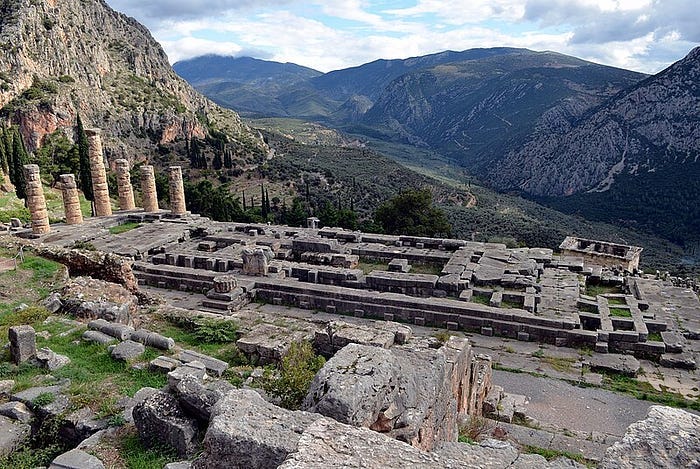The Oracle At Delphi Foreshadows Our Future With AI
The black box is our modern version of the Pythia

The future has always been unknowable, yet this never stops us from wondering and searching for answers. In the past, human oracles claimed to predict this future. Generally, their foresight came from a mysterious connection to the gods.
In our day, we still want to know what the future brings. In particular, many are interested in where technology in this age of information will lead us and how it will change civilization.
Much like the beginning of the industrial revolution, we’re sitting on top of a bubbling technological cauldron called AI, waiting to blast its lid off and change the world. Computer-driven intelligence is finding its way into every industry and many of the devices we use.
While some proclaim it as a miracle, others call it an agent of chaos, but none can calculate exactly where it will take us. Although we do have a hint. The greatest religious oracle in the ancient Greek world and AI share a strange attribute.
It involves how they generate their answers to our probing questions. And despite a difference of over two thousand years, modern people respond similarly to AI as the ancient Greeks did to an oracle of their gods ages ago.
But to truly see it, you must know a bit more about the Greek Oracle at Delphi.
The Pythia As The Voice Of The Gods

The current location of Delphi is a UNESCO World Heritage site. It’s thought the Myceneans first populated it from 1500 to 1100 BC, and later, Delphi became a holy site with an oracle around 800 BC. Within a few hundred years, the area gained influence over all of Greece.
But Classics professor Michael Scott at the University of Warwick says Delphi was more than a temple. It hosted Olympic-style games, music competitions, and festivals that made the site important to the Mediterranean.
Delphi was also used to increase the status of politicians and cities by funding buildings, statues, and celebrations. So, ambitious people promoted Delphi, and the holy site returned the favor.
In his book Delphi: A History of the Center of the Ancient World, Scott says:
“As a result, the value of a permanent monument at Delphi, in a world in which large gatherings of people from different cities and states were rare occasions, became an obvious choice for much of the Mediterranean world…It was the cumulative impact and the continued opportunities provided by this combined package of oracle, management, festivals, games, and dedications that ensured Delphi was propelled to such prominence in the ancient world.”
Lisa Karrer at the City College of New York, says the Greeks thought of Delphi as the center or navel of the world. It was also home to the god Apollo for most of the year. A temple was set up by an area near a local mountain, where vapors were said to escape and cause those exposed to go into trances and speak to the gods.
Local leaders eventually put one woman in charge of this divination. Despite women not having much power in Greece, this “Pythia” became a rock star in her world. Herodotus even mentions her in eight of his nine books.
Karrer says a female Oracle may have been chosen because the site was originally associated with an earth goddess.
While the upper level of the temple was for public worship, the lower inner sanctum, called the adyton (meaning “do not enter”), was only accessible by the Pythia and high-status priests. Here, she sat on a tripod above a crevice where fumes rose from the earth, causing her to commune with Apollo.
The gases sent the Pythia in a trance, and her words were translated by the priests. Some scientists believe these vapors were ethylene, which can cause a type of intoxication. Regardless of the method, visitors came to the temple and paid a fee to have their questions answered by the Pythia for centuries.
But these answers were rarely clear. Karrer states:
“Like any good fortuneteller, the mysterious poetic wording of the prophecy left room for a range of interpretations, leaving the deliverers of the message faultless. It was also assured that precious gifts would continue to be given in gratitude, or to encourage further favors and auspicious responses from Apollo.”
So, despite having no idea how these answers came to be, it didn’t stop pilgrims from around the Greek world from seeking Pythia’s knowledge. In fact, the mystery added to her authority, and we see this in our world, too.
The Mysterious Black Box We Can’t Get Enough Of
In March of 2016, an AI program named Alpha Go did what was once thought impossible by defeating the reigning human world champion of Go. This complex game has more possible board configurations than there are atoms in the universe.
During the match, Alpha Go performed a move no one had ever seen in thousands of years of gameplay. It’s now known in Go lore as “move 37.” But here’s where it gets weird. No one knows how Alpha Go came up with the strategy to perform this move — not even the algorithm’s creators.
Technology writer and author Meghan O’Gieblyn says AI processes information in an alien way (as in not human). In her book God, Human, Animal, Machine: Technology, Metaphor, and the Search For Meaning, she also says “move 37” logic is common for these systems.

Current AI is designed with layers of unseen neural nets that learn from experience. But during their “training,” they create “internal nodes that represent abstract features or relationships.” These connections can’t be translated into human language.
For instance, if an algorithm is good at identifying cats in pictures, it doesn’t understand what a cat is. The system can just pick out patterns. Consequently, the AI also can’t explain why or how it’s making decisions in a way we can understand.
According to O’Gieblyn:
“If you were to print out everything the networks do between input and output, it would amount to billions of arithmetic operations — an explanation that would be impossible to understand.”
This is called “the black box,” because you can’t see inside of it. You don’t know how this system you rely on is getting its answers, and many technologists prefer it this way.
O’Gieblyn says, “One theory holds that the less we meddle with the algorithms, the more accurate the results will be,” and there’s a “conviction that algorithmic revelations are perfect, and that any interpretation or human intervention risks undermining their authority.”
So, don’t question the black box since it provides the truth. Don’t worry about how. AI is an alien intelligence beyond our comprehension, and it’s not ours to question why — much like the Pythia. Or perhaps even question why an algorithm is punishing you, like Job in the Old Testament.
O’Gieblyn says this view parallels a fundamentalist theology:
“To obtain the superior knowledge machines possess, we must give up our desire to know why, and accept their outputs as pure revelation….As these technologies become increasingly integrated in the spheres of public life, many people find themselves in a position much like Job’s — denied the right to know why they were refused a loan, or fired from a job, or given a likelihood of developing cancer. It’s difficult, in fact, to avoid the comparison to divine justice.”
And talking about justice, she even says predictive models are used in the penal system:
They help judges figure out optimal prison term lengths for defendants.
These systems formulate the frequency of parole officer visits.
Predictive models also direct police where to patrol.
How do these systems work? Well, the users aren’t really sure, and this has initiated lawsuits by defendants claiming their right to due process has been violated by unexaminable processes hidden within the depths of the black box.
This also foreshadows what might come to be.
AI Systems And Our New Oracle

So, you want to know what our new future with our superpower of AI technology may look like? I’m no oracle, but I can give you a guess. It’ll have a vague semblance to the golden age of Delphi.
While the Pythia gathered her knowledge from the restricted area of the temple, we’ll have our own adyton. In our case, it’ll be the black box.
AI’s power of pattern recognition and ability to suck up the world’s information at instant recall will lead to breakthroughs.
Diseases that have plagued us for millennia may end.
Technology that can only be described as magic will also be part of our common world.
Powerful bodiless assistants will help us with daily tasks, freeing up time and making us more efficient. In fact, we won’t be able to live without them, just like smartphones.
How these miracles take place will likely remain unknown. They’ll just be gifts from the black box. But here’s the downside: the Pythia doesn’t only perform miracles, she can also be an agent of chaos.
Algorithms may fire you from your job, drop you from your insurance pool, pick your career or mate, and send you to prison for years because you’re a “threat to your community.” How will they come to these conclusions? Well, it’s not yours to question their perfect revelations.
I’ve been training AI models part-time for six months now. Their combination of abilities, hallucinations, and handicaps amaze and concern me.
But I’ve also been a human for forty-seven years and realize many would like to outsource responsibility and decision-making to others because it’s so stressful.
This makes the black box extra dangerous, since its mystery can add to the allure, just like the Pythia. I’m afraid some will be all too willing to allow “alien intelligence” to think for them. And this will be our future with AI.
It’s both a miracle and an agent of chaos, which must never be forgotten. Shutting these systems down would be foolish because they will perform wonders that make our lives better. But you’d also be foolish to submit to the whims of AI as if it were a deity or all-knowing oracle.
Despite the time difference, not much has changed since Delphi. Hopefully this time around, we can logically view our Pythia as a fallible tool, and not the voice of a god.
-Originally posted on Medium 1/27/25


